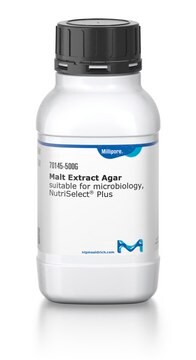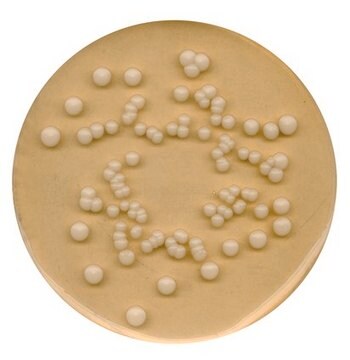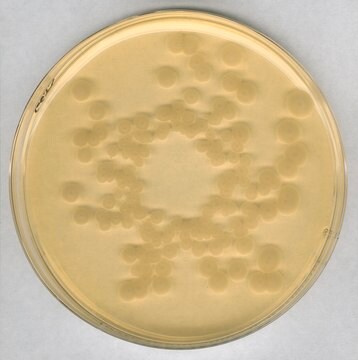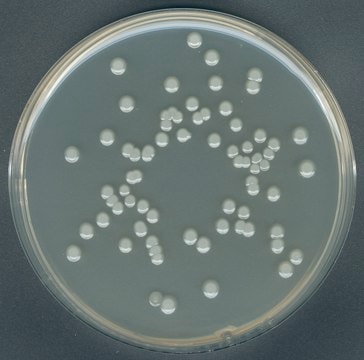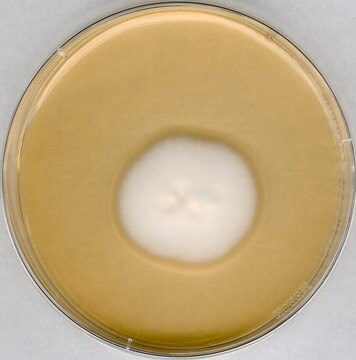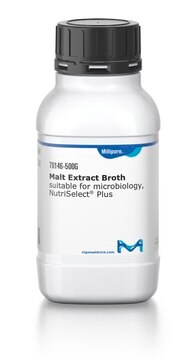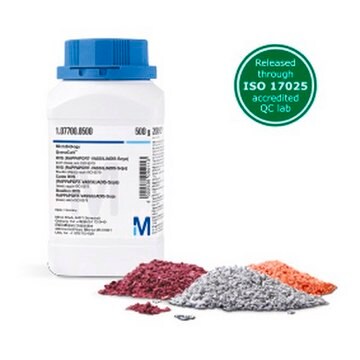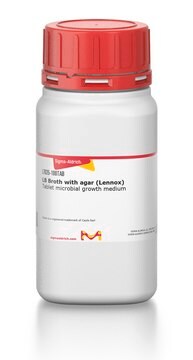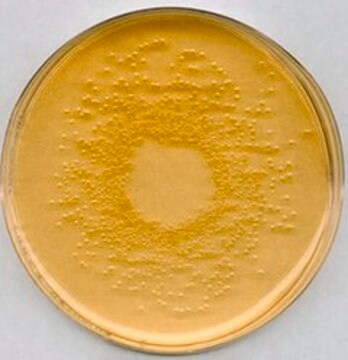1.05398
GranuCult® Malt extract agar
For the detection, isolation, and enumeration, for yeasts, for molds
About This Item
Produits recommandés
Agence
EP
JP
USP
Niveau de qualité
Stérilité
non-sterile
Forme
granular
Fabricant/nom de marque
GranuCult® prime
Technique(s)
microbiological culture: suitable
pH
5.6 (22 °C, 48 g/L in H2O, after autoclaving)
Solubilité
48 g/L
Masse volumique apparente
590 kg/m3
Application(s)
food and beverages
microbiology
Température de stockage
15-25°C
Adéquation
molds
yeasts
Catégories apparentées
Description générale
Application
Remarque sur l'analyse
Appearance (color): brown
pH-value (25 °C): 5.4 - 5.8
Growth promotion test in accordance with the current version of DIN EN ISO 11133.
Inoculum on reference medium (Candida albicans ATCC 10231 (WDCM 00054)):
Inoculum on reference medium (Saccharomyces cerevisiae ATCC 9763 (WDCM 00058)):
Inoculum on reference medium (Saccharomyces cerevisiae ATCC 9080):
Inoculum on reference medium (Rhodotorula mucilaginosa DSM 70403):
Colony count (Candida albicans ATCC 10231 (WDCM 00054)):
Colony count (Saccharomyces cerevisiae ATCC 9763 (WDCM 00058)):
Colony count (Saccharomyces cerevisiae ATCC 9080):
Colony count (Rhodotorula mucilaginosa DSM 70403):
Recovery on test medium (Candida albicans ATCC 10231 (WDCM 00054)): ≥ 70 %
Recovery on test medium (Saccharomyces cerevisiae ATCC 9763 (WDCM 00058)): ≥ 70 %
Recovery on test medium (Saccharomyces cerevisiae ATCC 9080): ≥ 70 %
Recovery on test medium (Rhodotorula mucilaginosa DSM 70403): ≥ 70 %
Growth (Geotrichum candidum DSM 1240): good to very good
Growth (Penicillium commune ATCC 10428): good to very good
Growth (Aspergillus brasiliensis (formerly A. niger) ATCC 16404 (WDCM 00053)): good to very good
Growth (Trichophyton ajelloi ATCC 28454): moderate to good
Incubation: Molds 7 days at 26 ± 2 °C, Yeasts 3 days, aerobic
A recovery rate of 70 % is equivalent to a productivity value of 0.7.
The indicated colony counts result from the sum of a triple determination.
Reference media: SABOURAUD Agar
Note de bas de page
The designations basic, plus, or prime are added to indicate the quality control level, from basic quality control to standard QC plus to prime for full regulatory compliance.
Informations légales
Code de la classe de stockage
11 - Combustible Solids
Classe de danger pour l'eau (WGK)
WGK 3
Certificats d'analyse (COA)
Recherchez un Certificats d'analyse (COA) en saisissant le numéro de lot du produit. Les numéros de lot figurent sur l'étiquette du produit après les mots "Lot" ou "Batch".
Déjà en possession de ce produit ?
Retrouvez la documentation relative aux produits que vous avez récemment achetés dans la Bibliothèque de documents.
Les clients ont également consulté
Articles
See how two water sources compare when preparing and performance testing microbiological culture media acc. to EN ISO 11133: centrally purified water vs. water from a Milli-Q® IX system were assessed. Tests included media specific for Listeria and Salmonella pathogens.
Notre équipe de scientifiques dispose d'une expérience dans tous les secteurs de la recherche, notamment en sciences de la vie, science des matériaux, synthèse chimique, chromatographie, analyse et dans de nombreux autres domaines..
Contacter notre Service technique